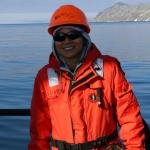Accelerating discoveries at Greenlands marine margins through international collaboration
Most of Greenland is covered by the expansive Greenland Ice Sheet, which, if it all melted, would cause sea level to rise by more than 20 feet. Greenland has been losing ice at a particularly rapid rate since the mid-1990s, with impacts for local and global fisheries. This AccelNet project (GRISONET) is designed to facilitate rapid and effective collaboration-building and foster discovery about the Greenland ice sheet, the ocean, the marine ecosystems and their interactions. GRISONET will address current knowledge gaps and community-identified needs by establishing international and interdisciplinary collaborations to assess, plan for, and accelerate ice-ocean-ecosystem research. The network of networks will develop strategies for the sharing of knowledge, data and syntheses, which will improve projections of future changes in Greenland and of their impact on global societies.
GRISONET will advance understanding of the role that ice sheet/ocean exchanges of heat and freshwater play in driving ice loss and in routing the meltwater away from the ice sheet. The network of networks engages oceanographers, glaciologists, atmospheric and climate scientists, marine ecosystem and fisheries experts to tackle the community-identified needs. GRISONET objectives include the establishment of a publicly-accessible database of existing ice/ocean data, protocols for the shared collection of future measurements, improved representation of ice/ocean exchanges in models, and a collaborative network structure that can be sustained. Activities will leverage resources from different networks within the US (e.g. US Arctic Observing Network, Interagency Arctic Research Policy Committee), international programs (International Ice Patrol, Ice Sheet Modeling Intercomparison Project, International Arctic Science Committee) and facilities of partners from Europe, Canada and Japan. Through working groups, international workshops, yearly summer schools for junior scientists, scholarly exchanges and professional training, GRISONET will prepare over 40 junior US scientists in science collaboration and the relevant cross-disciplinary science.
The Accelerating Research through International Network-to-Network Collaborations (AccelNet) program is designed to accelerate the process of scientific discovery and prepare the next generation of U.S. researchers for multiteam international collaborations. The AccelNet program supports strategic linkages among U.S. research networks and complementary networks abroad that will leverage research and educational resources to tackle grand scientific challenges that require significant coordinated international efforts.
Co-funding for this award is being provided by Navigating the New Arctic (NNA) program one of NSF's 10 Big Ideas. NNA supports projects that address convergence scientific challenges in the rapidly changing Arctic, empower new research partnerships, diversify the next generation of Arctic researchers, enhance efforts in formal and informal education, and integrate the co-production of knowledge where appropriate. This award aligns with those goals.
This award reflects NSF's statutory mission and has been deemed worthy of support through evaluation using the Foundation's intellectual merit and broader impacts review criteria.
Co-Principal Investigators
Publications



